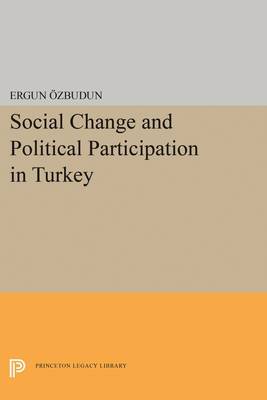
- Afhalen na 1 uur in een winkel met voorraad
- Gratis thuislevering in België vanaf € 30
- Ruim aanbod met 7 miljoen producten
- Afhalen na 1 uur in een winkel met voorraad
- Gratis thuislevering in België vanaf € 30
- Ruim aanbod met 7 miljoen producten
Zoeken
Omschrijving
Scholars have long argued that political participation tends to increase with economic and social modernization. In this study of Turkey, however, the author shows that rapid socio-economic growth has coincided with a substantial decline in turnout at the polls. His ecological analysis of subnational aggregate voting data for the sixties and the explanation of his startling findings form the core of this up-to-date and comprehensive survey of Turkey's political development.
Turkey is one of very few countries to combine rapid socio-economic change with a democratic system. The author demonstrates that in this context modernization tends to increase autonomous, instrumental, and class-based political participation, and to decrease mobilized, deferential, and communal-based political participation. The topics he examines include: social cleavages and the party system; distribution of land and income; geographical and social mobility; access to education; regional variations in voting turnout; urban-rural differences in voting behavior; socio-economic correlates of voting activity and party votes; and patterns of participation among peasants and the urban poor. Originally published in 1977. The Princeton Legacy Library uses the latest print-on-demand technology to again make available previously out-of-print books from the distinguished backlist of Princeton University Press. These editions preserve the original texts of these important books while presenting them in durable paperback and hardcover editions. The goal of the Princeton Legacy Library is to vastly increase access to the rich scholarly heritage found in the thousands of books published by Princeton University Press since its founding in 1905.Specificaties
Betrokkenen
- Auteur(s):
- Uitgeverij:
Inhoud
- Aantal bladzijden:
- 272
- Taal:
- Engels
- Reeks:
Eigenschappen
- Productcode (EAN):
- 9780691644059
- Verschijningsdatum:
- 19/04/2016
- Uitvoering:
- Hardcover
- Formaat:
- Genaaid
- Afmetingen:
- 156 mm x 234 mm
- Gewicht:
- 557 g

Alleen bij Standaard Boekhandel
+ 386 punten op je klantenkaart van Standaard Boekhandel
Beoordelingen
We publiceren alleen reviews die voldoen aan de voorwaarden voor reviews. Bekijk onze voorwaarden voor reviews.











